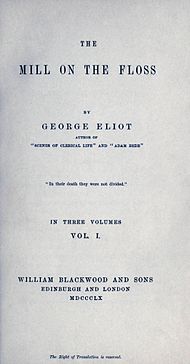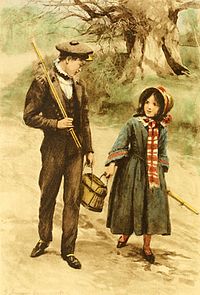- The Mill on the Floss
-
The Mill on the Floss 
First edition title page.Author(s) George Eliot Country United Kingdom Language English Genre(s) Novel Publisher William Blackwood and Sons, Edinburgh and London Publication date 1860 Media type Print (hardback and paperback) ISBN NA The Mill on the Floss is a novel by George Eliot (Mary Ann Evans), first published in three volumes in 1860 by William Blackwood. The first American edition was by Thomas Y. Crowell Co., New York.
Contents
Plot summary
The novel details the lives of Tom and Maggie Tulliver, a brother and sister growing up at Dorlcote Mill on the River Floss at its junction with the more minor River Ripple near the village of St. Ogg's in England, probably in the 1820s after the Napoleonic Wars but before the Reform Act of 1832. Both the river and the village are fictional.
The novel spans a period of 10 to 15 years, from Tom’s and Maggie’s childhood up until their deaths in a flood on the Floss. The book is fictional autobiography in part, reflecting the disgrace that George Eliot (Mary Ann Evans) herself had while in a lengthy relationship with a married man, George Henry Lewes.
Maggie Tulliver holds the central role in the book. The story begins when she is 7 years old, 13 years into the Tulliver's marriage. . Her relationship with her older brother Tom, and her romantic relationships with Philip Wakem, a hunchbacked, sensitive, and intellectual friend, and with Stephen Guest, a vivacious young socialite in St. Ogg's and assumed fiancé of Maggie’s cousin Lucy Deane, constitute the most significant narrative threads.
Tom and Maggie have a close yet complex bond, which continues throughout the novel. Their relationship is coloured by Maggie's desire to recapture the unconditional love her father provides before his death. Tom’s pragmatic and reserved nature clashes with Maggie’s idealism and fervor for intellectual gains and experience. Various family crises, including bankruptcy, Mr. Tulliver’s rancorous relationship with Philip Wakem’s father, which results in the loss of the mill, and Mr. Tulliver’s untimely death, serve both to intensify Tom’s and Maggie’s differences and to highlight their love for each other. To help his father repay his debts, Tom leaves his desultory schooling to enter a life of business. He eventually finds a measure of success, restoring the family’s former estate. Meanwhile Maggie languishes in the impoverished Tulliver home, her intellectual aptitude wasted in her socially isolated state. She passes through a period of intense spirituality, during which she renounces the world, spurred by Thomas à Kempis’s The Imitation of Christ.
This renunciation is tested by a renewed friendship with Philip Wakem, with whom she had developed an affinity while he was a fellow pupil with Tom. Against the wishes of Tom and her father, who both despise the Wakems, Maggie secretly meets with Philip, and together they go for long walks through the woods. The relationship they forge is founded partially in Maggie’s heartfelt pity for broken and neglected human beings, as well as an outlet for her intellectual romantic desires. Philip’s and Maggie’s attraction is, in any case, inconsequential because of the family antipathy. Philip manages to coax a pledge of love from Maggie. When Tom discovers the relationship between the two, however, he forces his sister to renounce Philip, and with him her hopes of experiencing the broader, more cultured world he represents.
Several more years pass, during which Mr. Tulliver dies. Lucy Deane invites Maggie to come and stay with her and experience the life of cultured leisure that she enjoys. This includes long hours conversing and playing music with Lucy's suitor, Stephen Guest, a prominent St. Ogg’s resident. Stephen and Maggie, against their rational judgments, become attracted to each other. The complication is further compounded by Philip Wakem’s friendship with Lucy and Stephen; he and Maggie are reintroduced, and Philip’s love for her is rekindled, while Maggie, no longer isolated, enjoys the clandestine attentions of Stephen Guest, putting her past professions for Philip in question. In the event Lucy intrigues to throw Philip and Maggie together on a short rowing trip down the Floss, but when Stephen unwittingly takes a sick Philip’s place, and Maggie and Stephen find themselves floating down the river, negligent of the distance they have covered, he proposes they board a passing boat to the next substantial city, Mudport, and get married. Maggie struggles between her love for Stephen and her duties to Philip and Lucy, contracted as it were in her past, when she was poor and isolated, and dependent on either of them for what good her life contained. Upon arrival in Mudport she rejects Stephen and makes her way back to St. Ogg's, where she lives for a brief period as an outcast, Stephen having fled to Holland. Although she immediately goes to Tom for forgiveness and shelter, he roughly sends her away, telling her that she will never again be welcome under his roof. Both Lucy and Philip forgive her, she in a moving reunion, he in an eloquent letter.
Maggie’s brief exile ends when the river floods. The flood is considered by some to be a deus ex machina. Those who do not support this view cite the frequent references to flood as a foreshadowing which makes this natural occurrence less contrived. Having struggled through the waters in a boat to find Tom at the old mill, she sets out with him to rescue Lucy Deane and her family. In a brief tender moment, the brother and sister are reconciled from all past differences. When their boat capsizes, the two drown in an embrace, thus giving the book its Biblical epigraph, “In their death they were not divided.”
Major characters
- Maggie Tulliver – young female protagonist
- Tom Tulliver – Maggie's brother
- Mrs Bessy Tulliver - Maggie and Tom's mother
- Phillip Wakem – hunchbacked classmate of Tom, and friend/suitor to Maggie
- Mr Tulliver – Maggie's and Tom's father, owner of the Mill
- Stephen Guest – affluent suitor to Maggie
Minor characters
- Mr. Wakem - Phillip's father and rival of Mr Tulliver
- Lucy Deane - Tom and Maggie's cousin, supposed to be betrothed to Stephen Guest
- Mr. Riley - auctioneer and appraiser, friend of Mr. Tulliver
- Rev. Walter Stelling - teacher of Tom and Phillip
- Bob Jakin - childhood friend of Tom who later helps Tom in business, both Tom and Maggie stay at his house at different times
- Mrs. Jane Glegg - leader of the Dodson clan, critical and dominating aunt of Maggie and Tom who stands up for Maggie after her scandal with Stephen
- Mrs. Sophy Pullet - Tom and Maggie's aunt
- Mrs. Susan Deane - Tom and Maggie's aunt
- Gritty Moss - Mr Tulliver's sister, mother of 8 children, 6 living
- Kezia - the Tulliver's servant
- Luke - the head miller
Locations
- Basset - home of Moss Farm
- Garum Firs - visited for a treat
- Midsummer - home of the academy
- Mudport
- St. Ogg's
- St. Ursula
- Wakem
Themes
Like other novels by George Elliot, The Mill on the Floss articulates the tension between circumstances and the spiritual energies of individual characters struggling against those circumstances. A certain determinism is at play throughout the novel, from Mr Tulliver’s grossly imprudent inability to keep himself from “going to law”, and thereby losing his patrimony and bankrupting his family, to the series of events which sets Maggie and Stephen down the river and past the point of no return. People such as Mr Tulliver are presented as unable to determine their own course rationally, and forces, be it the drift of the river or the force of a flood, are presented as determining the courses of people for them. On the other hand, Maggie’s ultimate choice not to marry Stephen, and to suffer both the privation of his love and the ignominy of their botched elopement demonstrates a final triumph of free will.
Critics assert that Maggie's need for love and acceptance is her underlying motivation throughout The Mill on the Floss, and the conflicts that arise in the novel often stem from her frustrated attempts at gaining this acceptance. Alan Bellringer has commented, "The two main themes of the novel, growing up and falling in love, lend themselves to amusement, but it is stunted growth and frustrated love that are emphasized." Commentators have often focused on the constant rejection of Maggie's talents and mannerisms by her family and society. Even the cultural norms of her community deny her intellectual and spiritual growth, according to Elizabeth Ermarth, "They are norms according to which she is an inferior, dependent creature who will never go far in anything, and which consequently are a denial of her full humanity."
Adaptations
The story was adapted as a film, The Mill on the Floss, in 1937, and as a TV mini-series in 1978.
A single episode television adaptation of the novel first was aired on 1 January 1997. Maggie Tulliver was portrayed by Emily Watson and Mr Tulliver by Bernard Hill.
A radio dramatisation in five one-hour parts was broadcast on BBC7 in 2009.
Cultural associations
A conversation between Flora Ackroyd and James Sheppard in Agatha Christie's The Murder of Roger Ackroyd:
‘That pen that George Eliot wrote The Mill on the Floss with—that sort of thing—well, it's only just a pen after all. If you're really keen on George Eliot, why not get The Mill on the Floss in a cheap edition and read it? ... I suppose you never read such old out-of-date stuff, Miss Flora? ... You're wrong, Dr Sheppard. I love The Mill on the Floss’.
References
The Mill on the Floss - George Elliot
External links
- The Mill on the Floss at Project Gutenberg.
- The Mill on the Floss PDF.
- The Mill on the Floss study guide, themes, quotes, literary devices, teacher resources
- The Mill on the Floss Map
Works by George Eliot Scenes of Clerical Life (1858) · The Lifted Veil (1859) · Adam Bede (1859) · The Mill on the Floss (1860) · Silas Marner (1861) · Romola (1862–63) · Felix Holt, the Radical (1866) · Middlemarch (1871–72) · Daniel Deronda (1876)
Categories:- Novels by George Eliot
- 1860 novels
- Victorian novels
- 1820s in fiction
Wikimedia Foundation. 2010.

